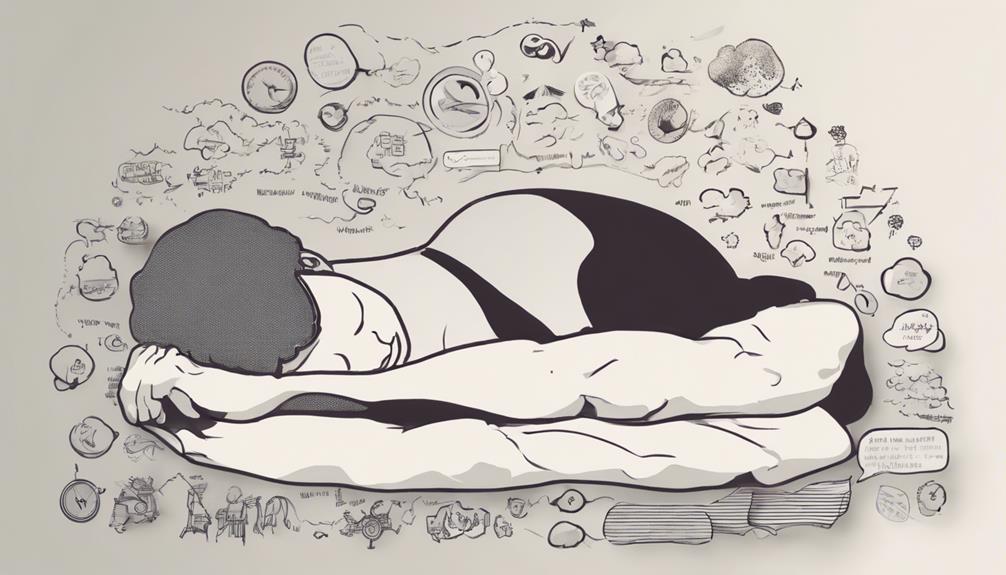Sleep apnea can result in weight gain by impacting metabolism, hormones, and physical activity. This condition disrupts the way your body processes energy, changes appetite-regulating hormones, and decreases your motivation for exercise. Hormonal imbalances stemming from sleep apnea can lead to increased cravings and affect how efficiently you burn calories. Additionally, this disorder can cause fatigue, resulting in a more inactive lifestyle. Treating sleep apnea with options like CPAP therapy can enhance sleep quality and increase physical activity. Recognizing the link between sleep apnea and weight gain is crucial for effectively managing both.
Key Takeaways
- Sleep apnea disrupts metabolism, promoting weight gain.
- Hormonal imbalances from sleep apnea lead to increased cravings and overeating.
- Sedentary lifestyle due to fatigue exacerbates weight gain.
- Excessive daytime sleepiness reduces physical activity, contributing to weight gain.
- Proper treatment of sleep apnea can aid in weight management by improving sleep quality and hormonal balance.
Impact of Sleep Apnea on Metabolism
Sleep apnea disrupts metabolic processes, potentially leading to weight gain through hormonal imbalances affecting appetite regulation. When sleep apnea alters our sleep patterns, it can influence metabolism, potentially contributing to weight gain. The hormonal changes triggered by sleep apnea may disrupt the delicate balance that regulates appetite, potentially leading to unhealthy eating habits.
Additionally, the fatigue caused by sleep apnea can reduce our motivation for physical activity, impacting energy expenditure and further complicating weight management.
These hormonal disruptions can also increase cravings for high-calorie foods, which can sabotage our efforts to maintain a healthy weight. It's essential to address sleep apnea to restore metabolic balance, which could potentially aid in weight loss endeavors.
Hormonal Imbalances and Weight Gain

Hormonal imbalances resulting from sleep apnea can greatly impact weight gain by disrupting appetite-regulating hormones like ghrelin and leptin. These imbalances can lead to changes in how your body signals hunger and fullness, potentially causing overeating and weight gain.
Ghrelin, known as the 'hunger hormone,' increases appetite, while leptin, the 'satiety hormone,' signals fullness. When these hormones are out of balance due to sleep apnea, it can result in increased cravings and a tendency to consume more calories than needed. Additionally, sleep apnea-induced hormonal changes may also influence your metabolism, making it harder for your body to burn calories efficiently. This combination of disrupted hormone levels and altered metabolism can contribute to weight gain over time.
Furthermore, fatigue and low energy levels from poor sleep quality can decrease your motivation for physical activity, further impacting your ability to manage weight effectively. Addressing hormonal imbalances through sleep apnea treatment may help regulate appetite, support healthier food choices, and improve weight management outcomes.
Sedentary Lifestyle and Weight Gain
Due to the fatigue associated with sleep apnea, individuals may find themselves engaging in less physical activity, which can contribute to weight gain. When experiencing poor sleep quality, the lack of energy and motivation can lead to a sedentary lifestyle, further exacerbating the impact of sleep apnea on weight management. A sedentary lifestyle not only reduces overall physical activity but also slows down metabolism, making weight gain more likely.
Moreover, hormonal imbalances resulting from inadequate sleep can disrupt appetite regulation, potentially causing individuals to crave high-carb foods. Consuming these foods can lead to increased calorie consumption, which, coupled with reduced physical activity, creates an environment conducive to weight gain. The changes in hormones due to sleep apnea can also affect how the body processes and stores fat, making it easier to gain weight and harder to lose it. Therefore, combating a sedentary lifestyle through increased movement and healthier food choices is vital in managing weight while dealing with sleep apnea.
Excessive Daytime Sleepiness and Physical Activity

Experiencing excessive daytime sleepiness due to sleep apnea can greatly reduce our motivation for physical activity. When we feel constantly tired and lacking in energy, engaging in regular exercise becomes challenging. This lack of physical activity can lead to weight gain as our calorie expenditure decreases. Fatigue hinders our ability to maintain a healthy weight through movement and exercise.
Fortunately, addressing excessive daytime sleepiness through proper treatment can help improve our physical activity levels and support weight management efforts. By seeking effective therapies for sleep apnea, such as continuous positive airway pressure (CPAP) or oral appliances, we can combat the fatigue that inhibits our ability to stay active.
Taking steps to manage excessive daytime sleepiness not only enhances our overall well-being but also empowers us to lead a more physically active lifestyle. Prioritizing treatment for sleep apnea can play a significant role in improving our energy levels, encouraging us to engage in regular exercise, and ultimately supporting our weight management goals.
Addressing Sleep Apnea for Weight Management
Improving energy levels and supporting weight loss efforts can be achieved through effective treatment of sleep apnea. When addressing sleep apnea for weight management, several key factors come into play:
- CPAP Therapy: Utilizing CPAP therapy for sleep apnea may not only improve sleep quality but also increase physical activity, aiding in weight management.
- Hormone Levels: After treatment for sleep apnea, hormonal changes can assist in appetite control, potentially leading to weight loss.
- Airway Obstruction: Addressing airway obstruction issues can help in reducing excess body weight and maintaining a healthy body mass index.
- Risk Factors: Managing sleep apnea is essential, especially in individuals with obesity, as it's an important risk factor for the condition.
- Complex Sleep Apnea: Understanding complex sleep apnea and its relationship with weight gain is vital for effective weight management strategies.
Frequently Asked Questions
Is It Hard to Lose Weight With Sleep Apnea?
It can be challenging to lose weight with sleep apnea due to fatigue and metabolic impacts. Hormonal changes from sleep apnea can affect appetite regulation, hindering weight loss.
Effective treatment can boost energy levels, aiding in weight loss efforts. Research shows that addressing sleep apnea can indirectly support weight loss through improved sleep quality and metabolism. Effective treatment can also enhance overall mood and reduce fatigue, making it easier to stay committed to exercise routines and healthier eating habits. This highlights the intertwined relationship between losing weight and sleep apnea, as better-managed sleep patterns can create a positive feedback loop for sustainable weight loss. By prioritizing sleep health, individuals may find it easier to overcome challenges that often accompany lifestyle changes.
Consider seeking treatment for sleep apnea to enhance weight loss outcomes.
Can Sleep Apnea Cause Rapid Weight Gain?
Yes, sleep apnea can cause rapid weight gain.
When untreated, the disruptions in sleep patterns and hormonal changes from sleep apnea can lead to increased appetite and cravings for high-carb foods.
This can result in consuming excess calories, contributing to rapid weight gain.
Addressing and managing sleep apnea through treatment is essential in preventing further weight gain and its associated health risks.
Why Does Sleep Apnea Cause Belly Fat?
Sleep apnea causes belly fat due to disrupted sleep patterns affecting metabolism and appetite regulation. Hormonal imbalances from sleep apnea can lead to carb cravings and reduced physical activity, promoting belly fat accumulation.
Effective treatment is essential for managing weight in individuals with sleep apnea. The impact underscores the importance of addressing sleep apnea for overall health and weight management.
Why Do CPAP Users Gain Weight?
As CPAP users, we may gain weight due to improved sleep quality boosting our appetite.
Better energy levels from regular CPAP use can lead to increased physical activity.
Hormone level changes after CPAP therapy might affect our metabolism and weight.
Lifestyle choices, dietary habits, and overall health status also play a role in weight gain for CPAP users.
It's important to monitor weight changes and discuss any concerns with healthcare providers for proper guidance.
Conclusion
To sum up, while sleep apnea can contribute to weight gain through various mechanisms, addressing the condition can help manage weight more effectively. One common objection may be the difficulty of treating sleep apnea, but with proper diagnosis and treatment, weight management becomes more achievable.
By focusing on improving sleep quality and overall health, individuals can better control weight gain associated with sleep apnea. Prioritizing sleep health is key to maintaining a healthy weight.









